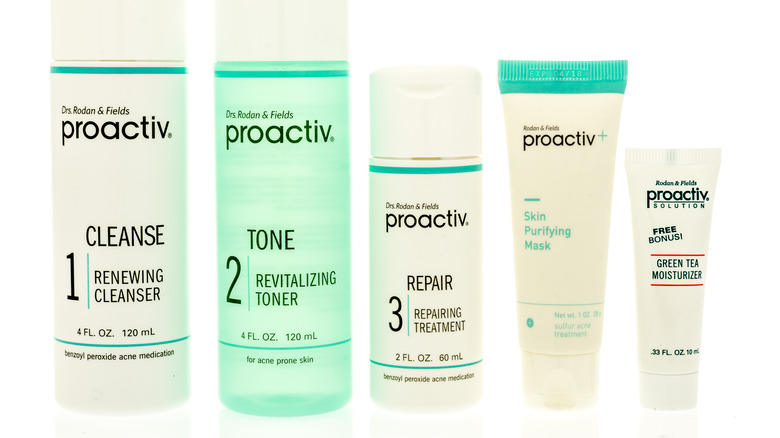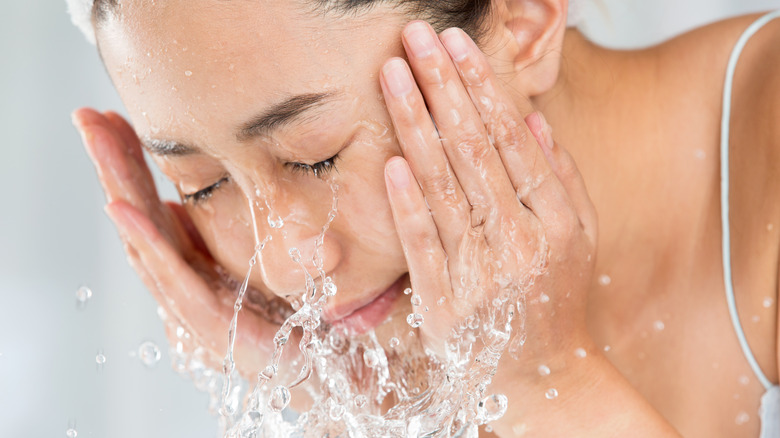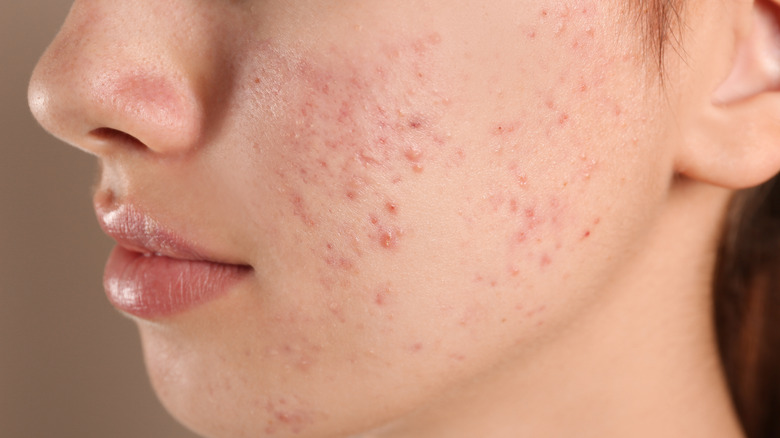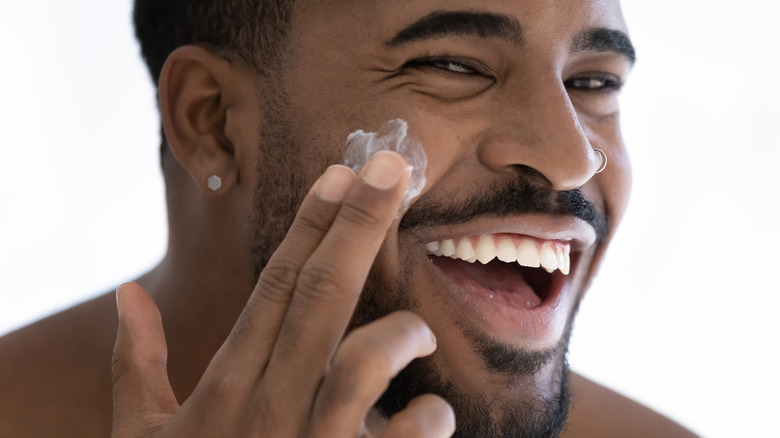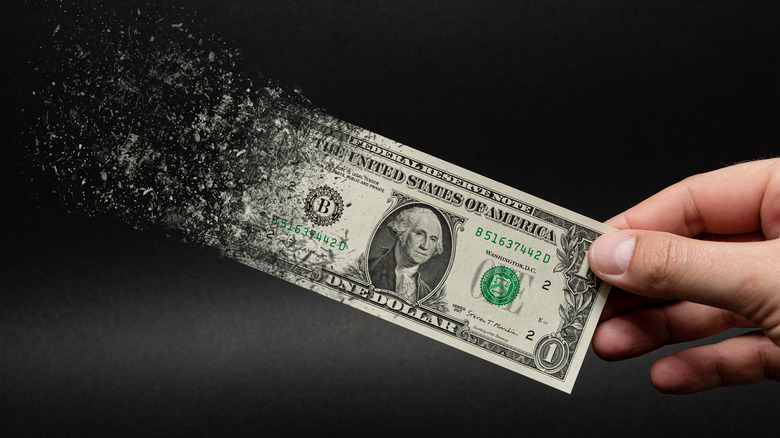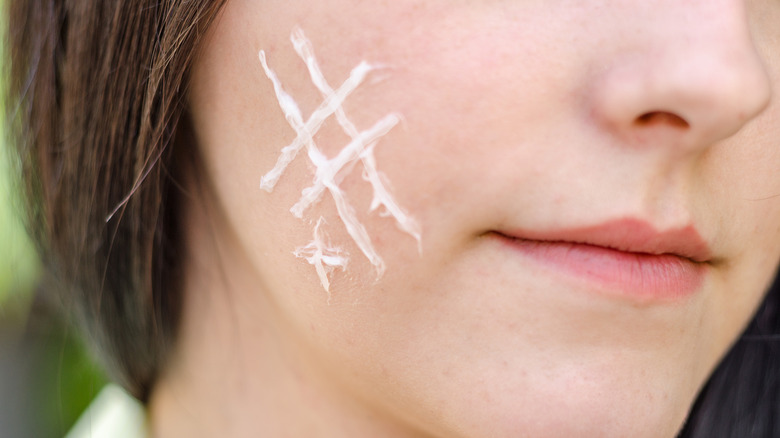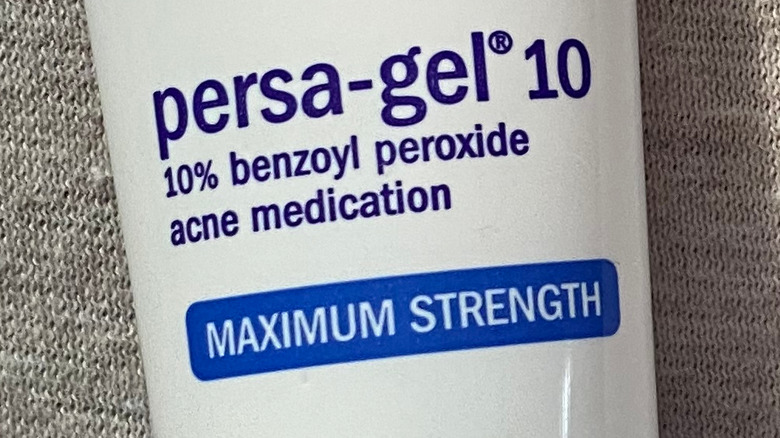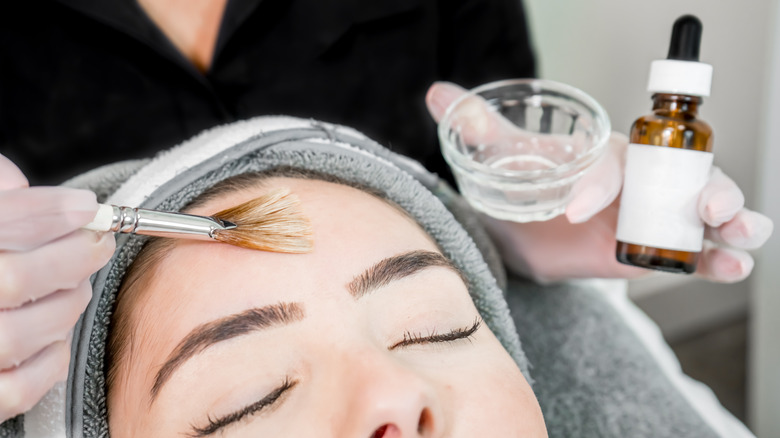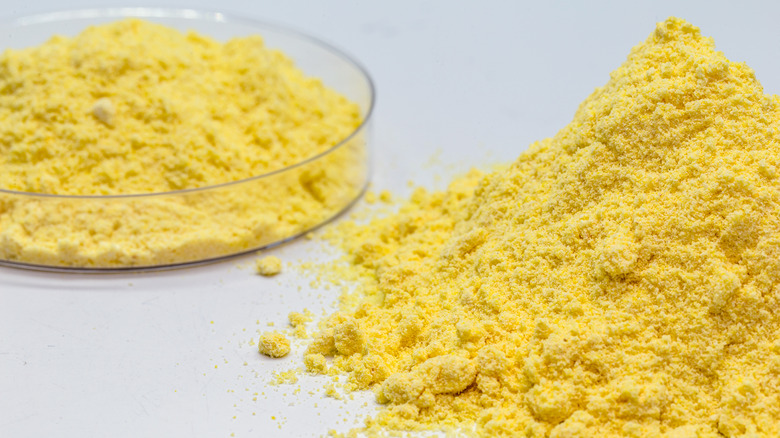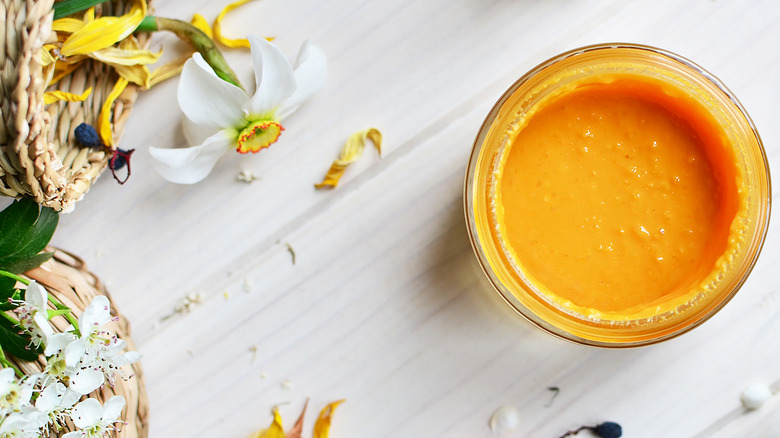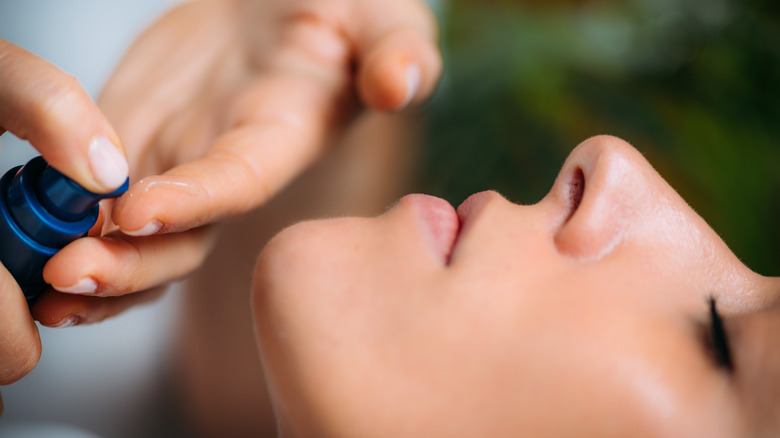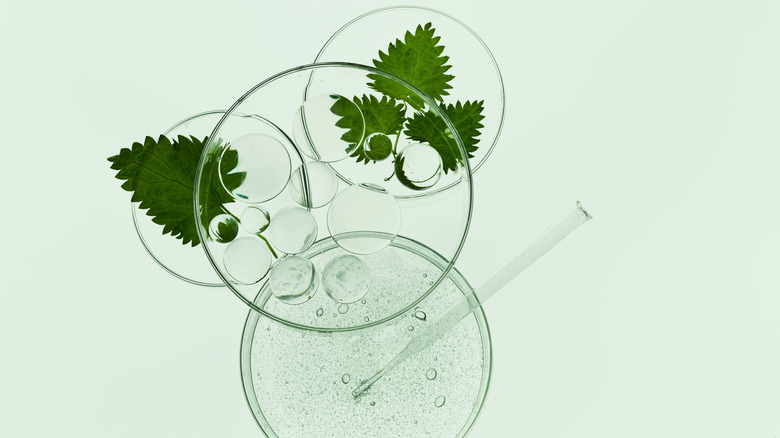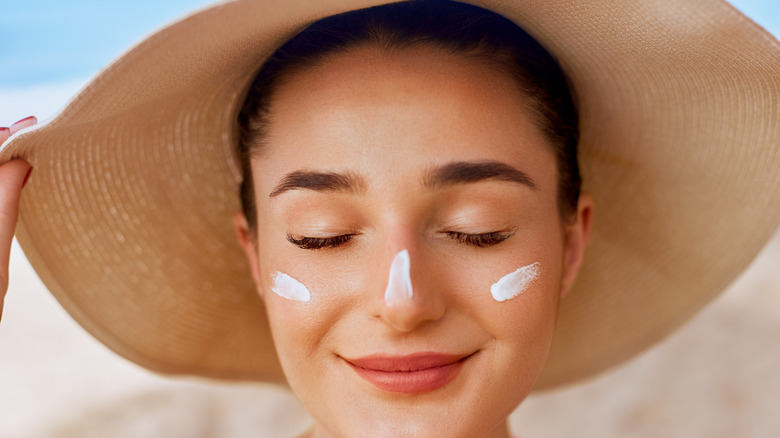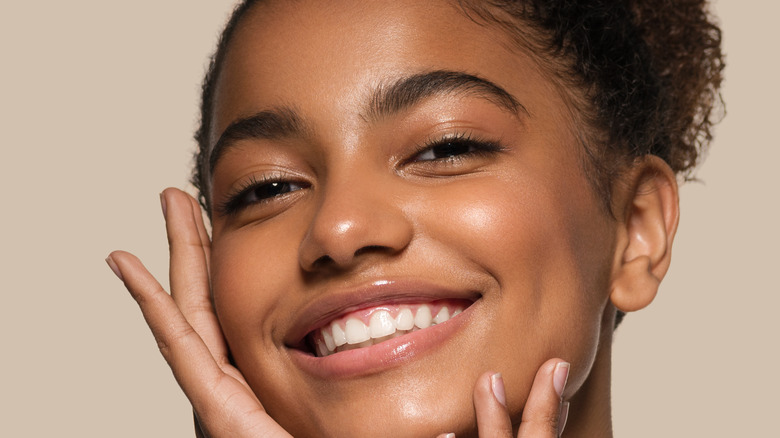The Truth About Proactiv
You have probably heard of Proactiv. Not only has the company hired countless celebs to entice the public into buying its products, but the laypeople they feature in advertisements show some serious results. If you have not heard of it, Proactiv is a super popular, over-the-counter acne treatment regimen. It has emotional, celebrity-endorsed infomercials, kiosks at the mall, and the word on the street has always been that "Proactiv really works!"
But, does it? The formulation includes a lengthy list of chemical-sounding ingredients. Upon doing a deep dive on the internet, it becomes clear that Proactiv does not work for everyone in the way the company claims it does (via Verywell Health). In an attempt to sift through the conflicting responses, we took to the internet with our proverbial magnifying glasses to get to the bottom of the Proactiv debate. Is it a line of over-priced, unnatural products that wreak havoc on our skin chemistry? Or is it one of the few collections of products that actually work to help manage and rectify painful, chronic acne?
What is Proactiv?
In its own words, Proactiv is a conglomerate of products that are "revolutionizing healthy skincare." Its website states that its products strike a delicate balance between gentle formulations of powerful, acne-fighting ingredients. Each formula is supposedly dermatologist-approved to fight stubborn and painful acne.
Proactiv offers 3 different lines of product. The Proactiv Solution acne treatment system is likely the 1 we have all become most familiar with. It includes a cleanser, a toner, and a repair treatment, with benzoyl peroxide as the standout ingredient of this lineup. In its description, we learn that this product line actually includes a body wash, a spot treatment serum, sunscreen, and more to help abate breakouts on acne-prone skin.
Another offering by Proactiv is its Proactiv+ Acne Treatment System. This routine combines its "Combination Therapy" and "Smart Target" technologies in the lineup of products. The treatment includes a skin smoothing exfoliator, a pore targeting treatment, and a complexion-perfecting hydrator. Interestingly, these products all boast benzoyl peroxide as their main ingredient, with a casual side of salicylic acid.
Finally, you have the option to order the ProactivMD 3-piece system, which includes an ultra-gentle cleanser, an adapalene retinoid gel, and an ultra-hydrating moisturizer. And, honestly, all of that just sounds... ultra.
What causes acne?
Let's get back to basics for a moment. Proactiv is a lineup of products that are meant to stop acne in its tracks, but what exactly is acne? The Mayo Clinic defines acne as "A skin condition that occurs when your hair follicles become plugged with oil and dead skin cells." The clogging of the hair follicles, or pores, can lead to blackheads, whiteheads, and pimples, which all fall under the umbrella of acne. Not only can these pore infections be painful, but they can leave their mark on our physical skin, as well as our self-confidence.
While the basic definition of where acne comes from is clear, there is some nuance to be considered when determining why you might be experiencing it. Your body might be producing excess oils, called sebum, which can lead to acne. Beyond that, general bacteria on the skin and inflammation can lead to acne. Stress, medications, diet, and hormone fluctuations (we are looking at you, cystic chin acne!) can all exacerbate acne breakouts.
The Mayo Clinic is quick to point out a few acne myths that we should avoid falling prey to — namely, acne supposedly caused by chocolate and greasy foods. As it turns out, a diet full of highly refined carbohydrates is more likely to cause acne. Furthermore, hygiene and cosmetics do not play as big a role as we assume they do.
How does Proactiv work?
Now that we have an understanding of what causes acne, we can look into how Proactiv is thought to work. Proactiv explains that the emergence of a breakout is actually the result of a reaction that was initiated weeks earlier when the pores became clogged. It explains that its philosophy is essentially to deliver acne-fighting medicine to the skin's entire surface to preemptively prevent breakouts. In the world of Proactiv, this is called "Combination Therapy," which is ultimately its fancy way of describing what happens when you load your skin up with a battery of harsh ingredients.
It goes on to state, "If you just treated the pimples without solving the problem of excess skin cell buildup and overproduction of oil to compensate for the dryness, you could end up worsening your acne issues." To summarize, Proactiv works by preventatively delivering hardcore acne medicine to your skin to inhibit the oil-clogging-the-pores cycle before it even begins, rather than just spot-treating acne as it arises. It recommends opting for 1 of its 3 skin treatment lines in order to avoid falling into that cycle. The logic is sound, but this begs the question — does this type of semi-aggressive skincare work on most people or only certain types of skin?
How much does Proactiv cost?
If you are just getting into the skincare game, your jaw might be hitting the floor right now as you survey the differing price points of some of the most popular skincare treatments. Conversely, if you are a skincare veteran, you might not be so knocked off of your equilibrium by discovering that a 60-day supply of Proactiv is $40.
To some, an additional $20 per month for skincare might be too expensive. For others, it might not be as noticeable. Proactiv has long been known to be a bit pricier than some drugstore options with the same active ingredients. On the flip side, Proactiv tends to be much less expensive than the heavier-duty prescription options that contain similar acne-fighting components. Bear in mind that some insurances cover or partially cover acne treatment. This means that some prescription options might be available to you for a lower cost, according to Healthline. If you are in the market for a powerful complexion-correcting product, it is best to do your research. Find the formulas that will best help you reach your skincare goals, and weigh the financial pros and cons.
How does Proactiv target acne?
Since Proactiv's approach to treating acne is pretty specific, it recommends slathering the stuff on your face consistently to prevent breakouts before they begin. It isn't particularly surprising to learn that this approach is not the best for all types of acne situations. According to both Verywell Health and Healthline, Proactiv is best utilized for mild to moderate acne. Proactiv even states that while its products may help reduce the appearance of scarring, they are not appropriate for people struggling with cystic or severe acne.
Verywell Health reports that Proactiv most effectively targets and reduces the occurrence of blackheads. Proactiv takes a preventative approach when it comes to treating acne, which is likely why so many people report positive results. Using benzoyl peroxide every day ensures that there is no oil or other skin gunk left in your pores to clog them. As with all things, a dermatologist can help you determine if trying Proactiv is right for your skin needs.
What does benzoyl peroxide do?
As mentioned, benzoyl peroxide is the most ubiquitous ingredient in most of Proactiv's formulations. In fact, benzoyl peroxide is one of the most common acne-banishing ingredients found in most over-the-counter acne washes, lotions, and gels. It is even available in gels that offer higher percentages of the stuff via a prescription from your doctor. Basically, what benzoyl peroxide does is strip your skin of bacteria. By removing much of the skin's bacteria, your pores are able to breathe at their leisure, which leads to fewer breakouts.
While benzoyl peroxide might sound like a miracle skin potion additive, it does come with a few side effects — most notably, dryness. According to Verywell Health, the best way to counteract the dryness that will most likely occur when you begin using a benzoyl peroxide-containing product is to rehydrate the skin. Furthermore, applying the moisturizer before adding benzoyl peroxide gel lessens its intensity on the surface of the skin.
Salicylic acid
Salicylic acid is another ingredient that is often found in acne-fighting skin concoctions. Salicylic acid works completely differently from benzoyl peroxide. Verywell Health advises avoiding using the 2 together because it could lead to excessive dryness and flaking of the skin. However, because salicylic acid is not especially strong on its own, it is a great additive to combine with other acne-eliminating options. Salicylic acid exfoliates the skin, which helps it shed dead cells more readily. If your skin doesn't shed those dead skills cells effectively, they can hang around and clog your pores. Since the salicylic acid removes dead skin cells so well, it can allow other medications to penetrate more deeply into the skin.
Salicylic acid has more earthier undertones than many common acne-fighting ingredients. It can be extracted from willow bark and wintergreen and can even treat skin conditions beyond acne. It can also be synthetically constructed in a lab, which is likely what most mainstream acne-fighting products with salicylic acid contain.
Sulfur
Sulfur is an ingredient that sounds a bit more familiar than the chemical-sounding ones, and with good reason. We definitely come into contact with it throughout our day-to-day lives, and it is one of the oldest known ways to treat acne! Who knew?
Sulfur works to diminish various skin conditions by encouraging it to dry and peel. It helps reduce the oiliness of the skin, and it also has antimicrobial properties. Much like salicylic acid, it helps the skin rid itself of dead skin cells. All of these powers combined make for a pretty solid, all-natural, albeit slightly stinky, way to manage your acne. Sulfur's antimicrobial elements help remove bacteria from the pores. At the same time, its exfoliating properties help remove dead skin that could also lead to breakouts. Using sulfur as a part of your acne routine is a great way to ensure your pores are free and clear to help prevent future breakouts (via Verywell Health).
Glycolic acid
Glycolic acid is one of the water-soluble iterations of alpha hydroxy acid (AHA), which is quite popular in many people's skincare routines. Alpha hydroxy acids are mainly compromised of ingredients from milk and fruit sugars. Specifically, glycolic acid is derived from sugar cane. Alpha hydroxy acids work as exfoliants on the skin, helping it to shed dry, dead skin cells to make way for fresh ones (via Verywell Health). Because glycolic acid has smaller particles than other alpha hydroxy acids, it is a more effective exfoliant.
Glycolic acid can help your skin shine while preventing breakouts. It can reduce the appearance of fine lines and wrinkles, and is even thought to aid in collagen production. Collagen is a protein that is abundant in the body, but its synthesis slows as we age. Collagen is one element that helps keep our skin plump and firm. Glycolic acid can help slow the breakdown of collagen, which can help us maintain our youthful complexions (per Verywell Health).
Adapalene
Another ingredient that can be found in many of Proactiv's formulations is adapalene. Adapalene is a retinoid that can help decrease swelling and inflammation. Retinoids are essentially chemicals that come from vitamin A; they are used to help the skin continue to produce plenty of collagen as our skin ages.
Adapalene and retinoids, in general, are available over-the-counter or in stronger doses from your doctor. Because retinoids are a class of strong medications, it is likely that you may experience side effects after you begin using adapalene-containing products. Typically, the symptoms of dry, flaky, or mildly burning skin dissipate after a few weeks. However, WebMD is pretty clear when it states that you should contact your doctor and quit using the products in question if the symptoms persist. Adapalene may also interact with other skin products, so use it with caution if you so choose. The retinoid components will likely react with alcohol, lime, or menthol-based products. Negative interactions have also been reported when used with astringent toners, drying lotions, and other skincare products (via WebMD).
What are the other ingredients?
While Proactiv's formulas typically contain a lineup of ingredients known to fight acne, they also contain some other, harder to identify ingredients. Most of the common yet chemical-sounding ingredients are included in smaller quantities. However, it still seems important to know what is in the solutions we are applying to our skin. Peg 100 stearate is a popular additive that is usually included as an emulsifier. Peg 100 stearate has been a topic of controversy in the world of skincare, but according to The Derm Review, the U.S. Food and Drug Administration (FDA) has deemed it safe for use in skincare products.
While many other ingredients are chemical-sounding in name, most of them have been declared safe for use in moderation by the FDA. One class of ingredients that has been under fire is parabens. "Parabens" is an umbrella term that encompasses many of the preservatives used in cosmetics. They are generally used to help prevent the products from growing mold and bacteria, both of which can be harmful to human health. The FDA states that at this time, there is no evidence to prove that parabens have harmful effects on our bodies. However, since they haven't been shown to be harmful, they are not well-regulated. Proactiv includes a variety of parabens, none of which are considered to be harmful by the FDA.
How does Proactiv compare to other acne products?
Proactiv is arguably one of the most well-known and popular acne products on the market, but how does it compare to other products that may have fewer celebrity endorsements and a smaller reach? Allure put the ProactivMD Essentials System up against 11 other acne-treatment systems. It took this approach to take out some of the guesswork for consumers. It chose 12 lines to go head-to-head in an epic battle of the skincare brands. It found that while most of them were incredibly effective, there is magic in buying products formulated to go together. This is because skincare systems are created without conflicting ingredients, meaning that the active ingredients can flourish to their full potential instead of being thwarted by each other's power.
Allure chose to feature the ProactivMD line because it includes sunscreen and many people have had success while using it. According to the publication, this skincare system shines because it can help stop breakouts in their tracks while also giving skin the sun protection it needs to maintain its youthful glow.
Are there side effects?
We now know that Proactiv contains some fairly harsh ingredients that are known to give your pores a deep scrubbing, so we have to wonder: does this intense cleaning of the skin have any side effects?
The answer is yes. Proactiv lets us all know that side effects from their products can occur. The most common side effects, while seeming fairly benign, may be problematic for some, as the goal is to heal the skin. These side effects include a rash resulting from product use, dryness, itchiness, or pealing of the skin, and stinging and burning immediately after using Proactiv. Healthline reports that many people do experience an adjustment period after beginning to use Proactiv. That is to say, some of the initial side effects may rectify themselves after a few weeks of use.
Less commonly, some people experience allergic reactions after they start using Proactiv. Allergic reactions can present as small red bumps, intense itching, and swollen, scaly, or blistered skin at the sites of use. It is recommended that you discontinue use immediately and follow up with your doctor if you experience an allergic reaction.
Is Proactiv right for me?
Proactiv works for some types of acne, but not for all types. It has caused allergic reactions in some, but has helped others reach their goals of painless, clear skin. How do we know if trying Proactiv is a path of action we should pursue?
Verywell Health summarizes an answer to this question very well. "Proactiv isn't a scam product, but it isn't a miracle cure either," Angela Palmer writes for the publication. "When it's all said and done, Proactiv is an over-the-counter acne treatment system that's best for mild acne." Palmer continues by reminding prospective consumers that it is pertinent to use the products as directed and give your skin time to find its equilibrium. If you decide to try Proactiv and don't start to see changes after about 12 weeks, try swapping the products out, as they may just not be the right match for your skin. If questions regarding this arise, it is likely best to direct them towards your dermatologist or doctor.

